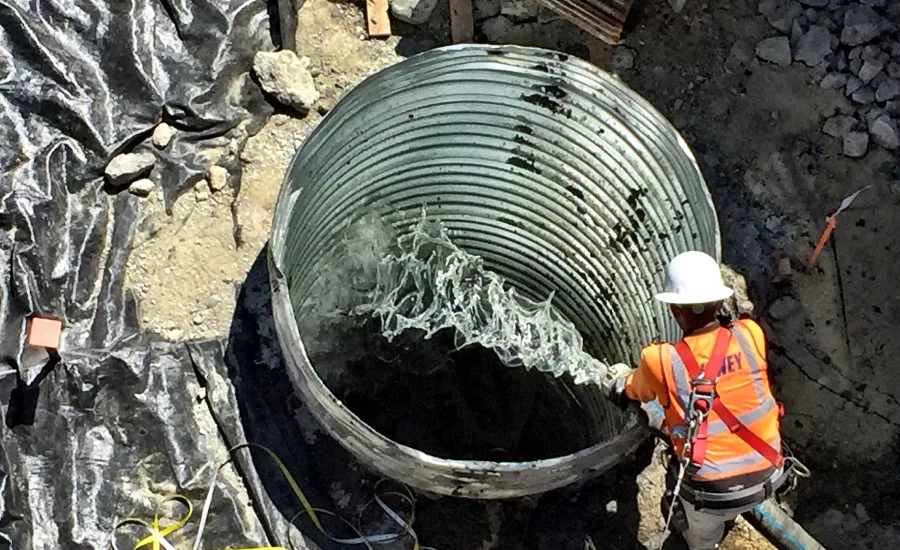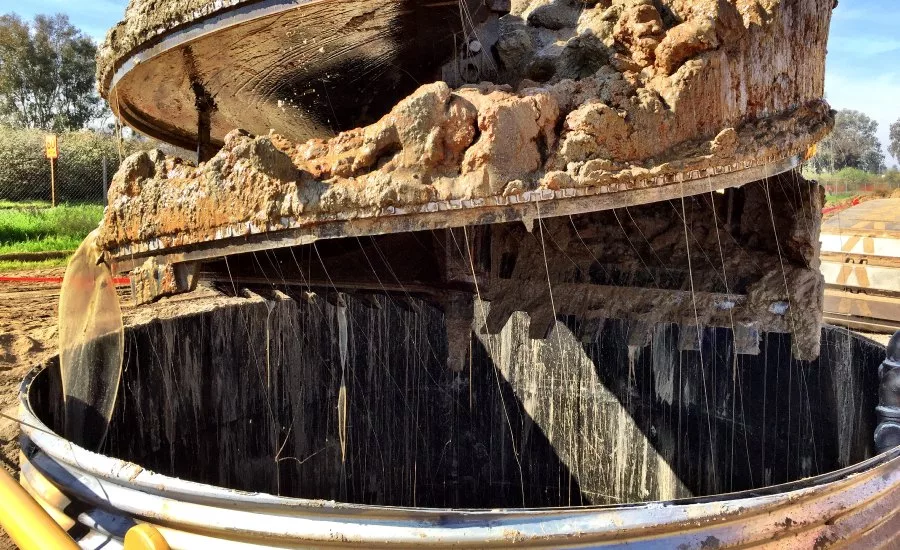The Case for Synthetic Slurry for Foundation Drilled Shafts
One Advantage: It Allows More Compact, Cleaner Jobsites

A worker sprays synthetic slurry into a foundation drilled shaft. Columnist George Dugan argues that state departments of transportation should qualify synthetic slurry more often for applicable construction projects.
Source: CETCO Drilling Products

A crew sinks a rebar cage into a prepared shaft.
Source: CETCO Drilling Products

Synthetic slurry, composed of a long-chain/high molecular weight synthetic polymer, creates a viscous, translucent fluid when mixed with water.
Source: CETCO Drilling Products
As a technical sales representative who has over 44 years of experience with drilling fluids and over 20 years of expertise in the foundation drilled shaft industry, I believe that transportation departments should be more frequently qualifying the use of synthetic slurry for foundation drilled shafts. Synthetic slurry can offer significant benefits over current, and sometimes costly, methods.
A foundation drilled shaft, or caisson, is a circular excavation constructed and designed to support structures like large buildings, bridges or overpasses. After the shaft is drilled (ideally down to solid bedrock), a steel reinforcement cage is installed and concrete poured to fill the shaft from the bottom up, displacing the slurry to create a caisson.
The design and construction of foundation shafts involve a lot of highly technical and specialized engineering. For example, if there is no solid bedrock to drill down to, the drilled shaft must rely on skin friction (the adhesion of the concrete to the earthen formation walls) to sustain the structure supported by the drilled shaft/caisson. Project engineers rely on operators to put the same level of technical know-how into their part of the work, and that can start with the slurry.
Slurry facilitates the construction of drilled shafts by preventing the hole from caving in or collapsing, while at the same time allowing the removal of soil. One critical function of slurry involves creating an almost impermeable barrier/membrane between itself and the surrounding soil. Maintaining a slurry level in the shaft at least 6 feet above the water table at all times creates positive hydrostatic head pressure. Positive hydrostatic head pressure pushes against the bentonite filter cake or polymer gel membrane on the walls of a shaft, preventing it from caving in.
“Mineral slurry” describes a viscous drilling fluid/slurry created using Wyoming sodium bentonite. Wyoming sodium bentonite has proved an effective solution in many different drilling industries, including oilfield drilling, water well drilling and drilled shafts. Wyoming sodium bentonite is a unique clay composed of microscopic platelets, which can create both filter cake for borehole stability and gel strength to suspend drill cuttings.
That gel strength — an asset in many types of drilling — becomes a drawback in drilled-shaft construction. A bentonite slurry keeps cuttings in suspension. In this application, operators would require expensive mechanical equipment to remove drill cuttings from the slurry, so that the slurry can be adequately displaced by concrete. This, of course, adds to the cost of a foundation drilling project.
Mineral/bentonite slurry also leaves a bentonite filter cake between the poured-in concrete and soil formation. This reduces the overall skin-friction/load-bearing capacity of the caisson, resulting in increased design and construction costs.
Finally, bentonite slurry creates disposal issues. Although bentonite slurry used in foundation drilled shafts is non-toxic, operators must dispose of it properly. Even modest drilled-shaft projects can produce large volumes of slurry, and disposal expenses for mineral/bentonite slurry only climb with the size of the job.
So why synthetic slurry? Synthetic slurry is composed of a long-chain/high molecular weight synthetic polymer that, when mixed with water, creates a viscous, translucent fluid that helps with borehole stability. This occurs by placing a polymer gel membrane between the slurry and formation walls, which allows for hydrostatic head pressure to be applied against it. On the average mineral slurry mix, it would take around 500 pounds of bentonite to make up 1,000 gallons of slurry. With a synthetic slurry, it may take only 2 to 9 pounds of polymer to do the same job (less shipping cost of material to the jobsite and less labor to handle the product). Unlike a mineral/bentonite slurry, a synthetic slurry allows drill cuttings to quickly fall out of suspension so they can be removed by the cutting tools instead of expensive solids removal equipment.
Synthetic slurry has another key advantage over mineral/bentonite slurry. The polymer gel membrane that allows synthetic slurry to create borehole stability basically dissolves as the concrete pours into the shaft. This means the concrete can better adhere to the formation wall, leading to better skin friction and higher load-bearing capacity.
The disposal of synthetic slurry is simply a matter of breaking down the synthetic polymer with calcium hypochlorite (bleach or swimming pool shock). This leaves a non-toxic fluid — equivalent to a low-grade fertilizer — that can be used on construction sites for dust control or disposed of per local regulations. Jobsite footprints are smaller when using synthetic slurry, and much cleaner because the drill spoils dry faster. In comparison, bentonite clay holds a significant amount of water and creates a muddy mess that gets tracked out to streets and highways.
As I’ve outlined in this article, there are significant advantages for deploying synthetic slurry for the construction of foundation drilled shafts on state roadways. As an employee of a company that develops and produces a wide range of specialty mineral products, including bentonite, I have seen these benefits and capabilities firsthand throughout my career. I hope you are able to understand and recognize the benefits of using synthetic slurry for foundation drilled shaft projects, and why more states should consider its use for DOT projects.
For more Drilling Fluids columns, visit www.thedriller.com/drillingfluids
Looking for a reprint of this article?
From high-res PDFs to custom plaques, order your copy today!


